| Listing 1 - 10 of 14 | << page >> |
Sort by
|
Book
ISBN: 1595930892 9781595930897 Year: 2005 Publisher: ACM
Abstract | Keywords | Export | Availability | Bookmark
 Loading...
Loading...Choose an application
- Reference Manager
- EndNote
- RefWorks (Direct export to RefWorks)
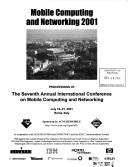
ISBN: 1581134223 9781581134223 Year: 2001 Publisher: ACM
Abstract | Keywords | Export | Availability | Bookmark
 Loading...
Loading...Choose an application
- Reference Manager
- EndNote
- RefWorks (Direct export to RefWorks)
Engineering & Applied Sciences --- Computer Science --- Wireless communication systems --- Wireless Internet --- Mobile computing --- Computer networks --- Congresses --- Information Technology --- Computer Science (Hardware & Networks) --- Wireless communication systems - Congresses --- Wireless Internet - Congresses --- Mobile computing - Congresses --- Computer networks - Congresses
Book
ISBN: 1461481023 1461481031 Year: 2013 Publisher: New York : Springer,
Abstract | Keywords | Export | Availability | Bookmark
 Loading...
Loading...Choose an application
- Reference Manager
- EndNote
- RefWorks (Direct export to RefWorks)
This brief surveys existing techniques to address the problem of long delays and high power consumption for web browsing on smartphones, which can be due to the local computational limitation at the smartphone (e.g., running java scripts or flash objects) level. To address this issue, an architecture called Virtual-Machine based Proxy (VMP) is introduced, shifting the computing from smartphones to the VMP which may reside in the cloud. Mobile Web Browsing Using the Cloud illustrates the feasibility of deploying the proposed VMP system in 3G networks through a prototype using Xen virtual machines (in cloud) and Android Phones with ATT UMTS network. Techniques to address scalability issues, resource management techniques to optimize the performance of the VMs on the proxy side, compression techniques to further reduce the bandwidth consumption, and adaptation techniques to address poor network conditions on the smartphone are also included.
Mobile computing. --- Cloud computing. --- Mobile computing -- Congresses. --- Computer science. --- Computer communication systems. --- Electrical engineering. --- Computer Science. --- Computer Communication Networks. --- Communications Engineering, Networks. --- Electronic data processing --- Web services --- Context-aware computing --- Portable computers --- Distributed processing --- Telecommunication. --- Electric communication --- Mass communication --- Telecom --- Telecommunication industry --- Telecommunications --- Communication --- Information theory --- Telecommuting --- Electric engineering --- Engineering --- Communication systems, Computer --- Computer communication systems --- Data networks, Computer --- ECNs (Electronic communication networks) --- Electronic communication networks --- Networks, Computer --- Teleprocessing networks --- Data transmission systems --- Digital communications --- Electronic systems --- Information networks --- Telecommunication --- Cyberinfrastructure --- Network computers --- Web browsing.
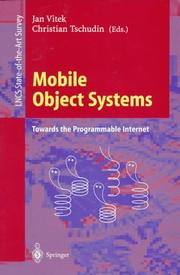
ISBN: 3540628525 354068705X 9783540628521 Year: 1997 Volume: 1222 Publisher: Berlin, Heidelberg : Springer Berlin Heidelberg : Imprint: Springer,
Abstract | Keywords | Export | Availability | Bookmark
 Loading...
Loading...Choose an application
- Reference Manager
- EndNote
- RefWorks (Direct export to RefWorks)
If the Internet is seen as a single, vast, programmable machine, what is the proper programming paradigm to facilitate development of the new applications it must offer? This state-of-the-art survey deals with this question. The situation we face is similar to that in the 1960s, when a new hardware/software architecture was introduced and it took some time for the programming-language and operating-system specialists to come up with the proper programming paradigms. Now we have the new and exciting paradigm of mobile computing, where computations are not bound to single locations but may move around at will to best use the available computer network resources. This paradigm will have a profound impact on the way distributed applications, in particular Internet applications, are designed and implemented.
Internet programming --- Intelligent agents (Computer software) --- Mobile computing --- Congresses. --- Telecommunications --- Computer Science --- Electrical & Computer Engineering --- Engineering & Applied Sciences --- Congresses --- Popular works. --- Computer communication systems. --- Software engineering. --- Artificial intelligence. --- Computer science. --- Popular Science. --- Popular Computer Science. --- Computer Communication Networks. --- Software Engineering/Programming and Operating Systems. --- Information Systems Applications (incl. Internet). --- Artificial Intelligence (incl. Robotics). --- Artificial Intelligence. --- Computer software engineering --- Engineering --- AI (Artificial intelligence) --- Artificial thinking --- Electronic brains --- Intellectronics --- Intelligence, Artificial --- Intelligent machines --- Machine intelligence --- Thinking, Artificial --- Bionics --- Cognitive science --- Digital computer simulation --- Electronic data processing --- Logic machines --- Machine theory --- Self-organizing systems --- Simulation methods --- Fifth generation computers --- Neural computers --- Application software. --- Application computer programs --- Application computer software --- Applications software --- Apps (Computer software) --- Computer software --- Communication systems, Computer --- Computer communication systems --- Data networks, Computer --- ECNs (Electronic communication networks) --- Electronic communication networks --- Networks, Computer --- Teleprocessing networks --- Data transmission systems --- Digital communications --- Electronic systems --- Information networks --- Telecommunication --- Cyberinfrastructure --- Network computers --- Informatics --- Science --- Distributed processing --- Internet programming - Congresses --- Intelligent agents (Computer software) - Congresses --- Mobile computing - Congresses.
Book
ISBN: 9789401796187 9401796173 9789401796170 9401796181 Year: 2015 Publisher: Dordrecht : Springer Netherlands : Imprint: Springer,
Abstract | Keywords | Export | Availability | Bookmark
 Loading...
Loading...Choose an application
- Reference Manager
- EndNote
- RefWorks (Direct export to RefWorks)
IT changes everyday’s life, especially in education and medicine. The goal of ITME 2014 is to further explore the theoretical and practical issues of Ubiquitous Computing Application and Wireless Sensor Network. It also aims to foster new ideas and collaboration between researchers and practitioners. The organizing committee is soliciting unpublished papers for the main conference and its special tracks.
Engineering. --- Communications Engineering, Networks. --- Computer Communication Networks. --- Coding and Information Theory. --- Coding theory. --- Telecommunication. --- Ingénierie --- Réseaux d'ordinateurs --- Codage --- Télécommunications --- Mobile computing -- Congresses. --- Ubiquitous computing -- Congresses. --- Wireless sensor networks -- Congresses. --- Electrical & Computer Engineering --- Engineering & Applied Sciences --- Electrical Engineering --- Ubiquitous computing --- Wireless sensor networks --- WSNs (Sensor networks) --- Data compression (Telecommunication) --- Digital electronics --- Information theory --- Machine theory --- Signal theory (Telecommunication) --- Computer programming --- Electric communication --- Mass communication --- Telecom --- Telecommunication industry --- Telecommunications --- Communication --- Telecommuting --- Computer networks --- Low voltage systems --- Sensor networks --- Wireless communication systems --- Context-aware computing --- Electrical engineering. --- Computer communication systems. --- Information theory. --- Communication theory --- Cybernetics --- Communication systems, Computer --- Computer communication systems --- Data networks, Computer --- ECNs (Electronic communication networks) --- Electronic communication networks --- Networks, Computer --- Teleprocessing networks --- Data transmission systems --- Digital communications --- Electronic systems --- Information networks --- Telecommunication --- Cyberinfrastructure --- Electronic data processing --- Network computers --- Electric engineering --- Engineering --- Distributed processing
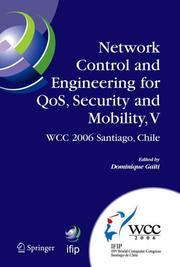
ISBN: 9780387348254 0387348255 9786610744268 128074426X 0387348271 Year: 2006 Publisher: New York, United States : Springer,
Abstract | Keywords | Export | Availability | Bookmark
 Loading...
Loading...Choose an application
- Reference Manager
- EndNote
- RefWorks (Direct export to RefWorks)
International Federation for Information Processing The IFIP series publishes state-of-the-art results in the sciences and technologies of information and communication. The scope of the series includes: foundations of computer science; software theory and practice; education; computer applications in technology; communication systems; systems modeling and optimization; information systems; computers and society; computer systems technology; security and protection in information processing systems; artificial intelligence; and human-computer interaction. Proceedings and post-proceedings of referred international conferences in computer science and interdisciplinary fields are featured. These results often precede journal publication and represent the most current research. The principal aim of the IFIP series is to encourage education and the dissemination and exchange of information about all aspects of computing. For more information about the 300 other books in the IFIP series, please visit www.springer.com. For more information about IFIP, please visit www.ifip.org.
Computer networks --- Mobile computing --- Réseaux d'ordinateurs --- Informatique mobile --- Management --- Congresses. --- Quality control --- Security measures --- Gestion --- Congrès --- Qualité --- Contrôle --- Sécurité --- Mesures --- Computer networks -- Management -- Congresses. --- Computer networks -- Quality control -- Congresses. --- Computer networks -- Security measures -- Congresses. --- Mobile computing -- Congresses. --- Telecommunications --- Computer Science --- Electrical & Computer Engineering --- Engineering & Applied Sciences --- Congresses --- Computer science. --- Computer organization. --- Computer communication systems. --- Computer Science. --- Computer Communication Networks. --- Computer Systems Organization and Communication Networks. --- Computer Science, general. --- Computer network architectures. --- Informatics --- Science --- Architectures, Computer network --- Network architectures, Computer --- Computer architecture --- Communication systems, Computer --- Computer communication systems --- Data networks, Computer --- ECNs (Electronic communication networks) --- Electronic communication networks --- Networks, Computer --- Teleprocessing networks --- Data transmission systems --- Digital communications --- Electronic systems --- Information networks --- Telecommunication --- Cyberinfrastructure --- Electronic data processing --- Network computers --- Organization, Computer --- Electronic digital computers --- Distributed processing
Book
ISSN: 21945357 ISBN: 3642354602 3642354610 128393552X Year: 2013 Volume: 203 Publisher: Heidelberg [Germany] ; New York : Springer,
Abstract | Keywords | Export | Availability | Bookmark
 Loading...
Loading...Choose an application
- Reference Manager
- EndNote
- RefWorks (Direct export to RefWorks)
The renaissance of internet has reached the mainstream that is named as Web 2.0. People are now using the web to build things they have never thought of earlier. Experts take a step forward to what we contribute, and extend it and give back to the society, i.e. really the boon of internet computing. It has revolutionized the current business environment, not as a mere computing tool, but offers versatile services and increase the productive flow of information. It is a new dimension in computing systems by which companies can curtail their operating expenses, by hosting and operating through the internet. Now the users can access the required information by means of any device connected with an internet. The challenge ahead for implementing this versatile system is that the software and technology has to be developed and deployed simultaneously vis-a-vis safeguarding the security and privacy of information. This book encompasses various research and developments in Internet technology and put in the context of New Paradigms in Internet Computing. This includes chapters from academic research community as well as industry experts in the area of business models based on Software, Protocols, Supply Chain Management, Security and also Cloud Computing.
Electronic data processing -- Distributed processing -- Congresses. --- Internet programming -- Congresses. --- Mobile computing -- Congresses. --- Internet --- Electronic data processing --- Engineering & Applied Sciences --- Computer Science --- Computer programs --- Cloud computing. --- Internet programming. --- Web services. --- Distributed processing. --- Engineering. --- Artificial intelligence. --- Computational intelligence. --- Computational Intelligence. --- Artificial Intelligence (incl. Robotics). --- Intelligence, Computational --- Artificial intelligence --- Soft computing --- AI (Artificial intelligence) --- Artificial thinking --- Electronic brains --- Intellectronics --- Intelligence, Artificial --- Intelligent machines --- Machine intelligence --- Thinking, Artificial --- Bionics --- Cognitive science --- Digital computer simulation --- Logic machines --- Machine theory --- Self-organizing systems --- Simulation methods --- Fifth generation computers --- Neural computers --- Construction --- Industrial arts --- Technology --- Distributed computer systems in electronic data processing --- Distributed computing --- Distributed processing in electronic data processing --- Computer networks --- Application software --- Cloud computing --- Computer programming --- Web services --- Distributed processing --- Artificial Intelligence.
Book
ISBN: 3642018017 3642018025 Year: 2009 Publisher: Berlin ; Heidelberg : Springer,
Abstract | Keywords | Export | Availability | Bookmark
 Loading...
Loading...Choose an application
- Reference Manager
- EndNote
- RefWorks (Direct export to RefWorks)
This book constitutes the thoroughly refereed proceedings of the Second International Conference on MOBILe Wireless MiddleWARE, Mobilware 2009, held in Berlin, Germany, in April 2009. The 29 revised full papers presented were carefully reviewed and selected from 63 contributions. The papers are organized in topical sections on location and tracking supports and services; Location-aware and context-aware mobile support and services. middleware for QoS awareness, adaptation, and fault-tolerance of mobile services; mobility-aware wireless service discovery, management, and delivery; middleware for mobile computing & Intelligent and mobile agent technologies for mobile systems and services; OS/middleware for embedded systems, wearable networks, and personal area networks; mobility management and handoff management in heterogeneous networks.
Middleware. --- Mobile computing -- Congresses. --- Mobile computing. --- Wireless communication systems. --- Engineering & Applied Sciences --- Computer Science --- Mobile computing --- Middleware --- Wireless communication systems --- Computer science. --- Computer communication systems. --- Special purpose computers. --- Software engineering. --- Computers. --- Computer engineering. --- Computer Science. --- Computer Communication Networks. --- Computer Engineering. --- Information Systems Applications (incl. Internet). --- Information Systems and Communication Service. --- Software Engineering. --- Special Purpose and Application-Based Systems. --- Computer software --- Information systems. --- Computer software engineering --- Engineering --- Application software. --- Special purpose computers --- Computers --- Automatic computers --- Automatic data processors --- Computer hardware --- Computing machines (Computers) --- Electronic brains --- Electronic calculating-machines --- Electronic computers --- Hardware, Computer --- Computer systems --- Cybernetics --- Machine theory --- Calculators --- Cyberspace --- Application computer programs --- Application computer software --- Applications software --- Apps (Computer software) --- Communication systems, Computer --- Computer communication systems --- Data networks, Computer --- ECNs (Electronic communication networks) --- Electronic communication networks --- Networks, Computer --- Teleprocessing networks --- Data transmission systems --- Digital communications --- Electronic systems --- Information networks --- Telecommunication --- Cyberinfrastructure --- Electronic data processing --- Network computers --- Design and construction --- Distributed processing
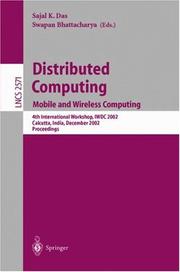
ISBN: 354000355X 9783540003557 3540363858 Year: 2002 Volume: 2571 Publisher: Berlin, Heidelberg : Springer Berlin Heidelberg : Imprint: Springer,
Abstract | Keywords | Export | Availability | Bookmark
 Loading...
Loading...Choose an application
- Reference Manager
- EndNote
- RefWorks (Direct export to RefWorks)
This book constitutes the refereed proceedings of the 4th International Workshop on Distributed Computing, IWDC 2002, held in Calcutta, India, in December 2002. The 31 revised full papers and 3 student papers presented together with 3 keynote papers were carefully reviewed and selected from more than 90 submissions. The papers are organized in topical sections on Web caching, distributed computing, wireless networks, wireless mobile systems, VLSI and parallel systems, optical networks, and distributed systems.
Electronic data processing --- Mobile computing --- Wireless communication systems --- Distributed processing --- Computer science. --- Computer communication systems. --- Computer programming. --- Software engineering. --- Operating systems (Computers). --- Computers. --- Computer Science. --- Theory of Computation. --- Computer Communication Networks. --- Programming Techniques. --- Software Engineering. --- Operating Systems. --- Information theory. --- Computer software engineering --- Engineering --- Informatics --- Science --- Computer operating systems --- Computers --- Disk operating systems --- Systems software --- Communication theory --- Communication --- Cybernetics --- Operating systems --- Electronic computer programming --- Electronic digital computers --- Programming (Electronic computers) --- Coding theory --- Communication systems, Computer --- Computer communication systems --- Data networks, Computer --- ECNs (Electronic communication networks) --- Electronic communication networks --- Networks, Computer --- Teleprocessing networks --- Data transmission systems --- Digital communications --- Electronic systems --- Information networks --- Telecommunication --- Cyberinfrastructure --- Network computers --- Automatic computers --- Automatic data processors --- Computer hardware --- Computing machines (Computers) --- Electronic brains --- Electronic calculating-machines --- Electronic computers --- Hardware, Computer --- Computer systems --- Machine theory --- Calculators --- Cyberspace --- Programming --- Electronic data processing - Distributed processing - Congresses --- Mobile computing - Congresses --- Wireless communication systems - Congresses
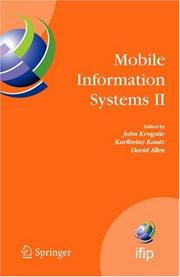
ISBN: 9780387295510 0387295518 9786610616671 1280616679 0387311661 Year: 2005 Publisher: New York, New York : Springer,
Abstract | Keywords | Export | Availability | Bookmark
 Loading...
Loading...Choose an application
- Reference Manager
- EndNote
- RefWorks (Direct export to RefWorks)
Mobility is perhaps the most important market and technological trend within information and communication technology. With the advent of new mobile infrastructures providing high bandwidth and constant connection to the network from virtually everywhere, the way people use information resources for work and leisure is being radically transformed. The rapid developments in information technology, particularly communication and collaboration technologies, are substantially changing the landscape of organizational computing. Workers in any business area are becoming increasingly mobile. Workers in more and more areas will be required to act flexibly within the constraints of the business processes of the company (or companies) they are currently working for. At the same time they will often want to use the same information technology to support their private tasks. Over the last years, a new breed of information systems has appeared to address this emerging situation, referred to as mobile information systems. Specific applications are also being characterized as, among others, m-Commerce, m-Learning, and m-Business. This book contains the proceedings of the second IFIP TC8 Working Conference on Mobile Information Systems which was held in December 2005 in Leeds, UK and sponsored by the International Federation of Information Processing (IFIP). Mobile Information Systems II aims to: · Clarify differences and similarities between the development of mobile and more traditional information systems. · Investigate the organizational impact of mobile information systems. · Investigate the 'e to m shift' , for example in m-Commerce relative to e-Commerce. · Investigate mobile commerce applications combined with the advantages of mobile communications technologies, the drivers of which have been identified as ubiquity, accessibility, security, convenience, localization, instant connectivity, and personalization. · Evaluate existing and newly developed approaches for the analysis, design, implementation, and evolution of mobile information systems. · Investigate technical issues and the constraints they impose on mobile information systems functionalities and design.
Mobile computing --- Mobile communication systems --- Mobile commerce --- Informatique mobile --- Radiocommunications mobiles --- Commerce mobile --- Congresses --- Congrès --- Electronic books. -- local. --- Mobile commerce -- Congresses. --- Mobile communication systems -- Congresses. --- Mobile computing -- Congresses. --- Engineering & Applied Sciences --- Computer Science --- M-business --- M-commerce --- Mobile business --- Mobile payments --- Computer science. --- Computer organization. --- Computer communication systems. --- Computers. --- E-commerce. --- Computer Science. --- Computer Communication Networks. --- Information Systems and Communication Service. --- e-Commerce/e-business. --- Computer Systems Organization and Communication Networks. --- Computer Science, general. --- Cybercommerce --- E-business --- E-commerce --- E-tailing --- eBusiness --- eCommerce --- Electronic business --- Internet commerce --- Internet retailing --- Online commerce --- Web retailing --- Commerce --- Information superhighway --- Automatic computers --- Automatic data processors --- Computer hardware --- Computing machines (Computers) --- Electronic brains --- Electronic calculating-machines --- Electronic computers --- Hardware, Computer --- Computer systems --- Cybernetics --- Machine theory --- Calculators --- Cyberspace --- Communication systems, Computer --- Computer communication systems --- Data networks, Computer --- ECNs (Electronic communication networks) --- Electronic communication networks --- Networks, Computer --- Teleprocessing networks --- Data transmission systems --- Digital communications --- Electronic systems --- Information networks --- Telecommunication --- Cyberinfrastructure --- Electronic data processing --- Network computers --- Organization, Computer --- Electronic digital computers --- Informatics --- Science --- Distributed processing --- Electronic commerce --- Electronic funds transfers --- Information systems. --- Computer network architectures. --- Architectures, Computer network --- Network architectures, Computer --- Computer architecture
| Listing 1 - 10 of 14 | << page >> |
Sort by
|

 Search
Search Feedback
Feedback About UniCat
About UniCat  Help
Help News
News